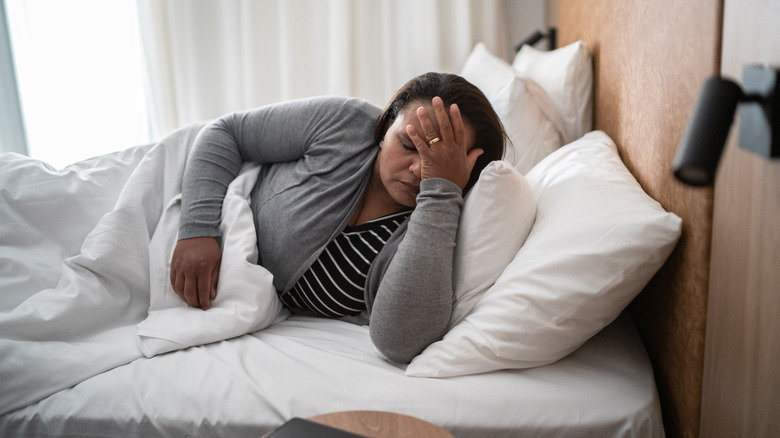You’re ready for slumber with your warmest jammies and the blanket that makes sleep come with ease. Your mind is blank, and sleep is just on the horizon. However, then you feel it. A tingle starts in your hand and works its way up your arm. Or you might have tingles in your legs that make it feel like they will break off if you don’t move them. These nighttime tingles are known by the medical term “paresthesia” and can happen anywhere on your body, according to Healthline.
The feeling created by paresthesia might be light enough to ignore it and sleep anyway. More often than not, it’s an annoying burning and prickling feeling that leaves you tossing and turning until you find a comfortable position. The National Institute of Neurological Disorders (NINDS) notes that temporary paresthesia can happen from time to time for various reasons; however, chronic paresthesia at night likely comes from a medical condition, like restless leg syndrome, sleep apnea, peripheral neuropathy, pinched nerve, or anxiety.
Drifting off to sleep should be as seamless as hitting your pillow and walking to dreamland. But, since it’s sometimes not, we’ll help you dissect these different ailments and common treatments for a good night’s rest.
Restless leg syndrome is a common cause of bedtime tingles

When nighttime tingles drive you batty, it might be a case of restless leg syndrome, when sitting or lying still creates a need to move your legs (per Mayo Clinic). While this condition can be due to age, heredity, or pregnancy, it leaves the sufferer with a crawling, throbbing, or aching sensation in their legs at bedtime. Your legs might also kick out or twitch while sleeping, leading to kicking your partner or even a wall. The only way to get relief from this frustrating condition is to move your legs, so you’ll find yourself tossing and turning in your bed or moving your feet.
According to NINDS, this sleep and movement disorder affects about 7% to 10% of the population in the U.S., and middle-aged females are more likely to succumb to symptoms. In addition to striking older populations, this disease has no cure, but treatments are available in the form of lifestyle changes and medication. For example, Johns Hopkins Medicine notes that getting into a nightly routine, giving up stimulants, getting moderate exercise, and eating a balanced diet can go a long way in treating the symptoms. You might also require medication to help keep your legs still, like benzodiazepines or anticonvulsants, in severe cases.
Tingling and numbness before bed might signal sleep apnea

Have your family and friends told you that you snore or stop breathing while you nap on the couch or in bed? You may have a common condition known as sleep apnea, where an airway obstruction or faulty brain signals forget to tell you to breathe during sleep (per National Heart, Lung, and Blood Institute).
Obstructive sleep apnea is the best-known type, but tingles happen with central sleep apnea, where the signal to breathe doesn’t come from your brainstem. Conditions that affect the brainstem, like stroke, or medications, like narcotics, are common culprits of this disorder (per Medline Plus). In addition to causing excessive sleepiness and abrupt waking, sleep apnea can also lead to problems with the endocrine and digestive systems, states Healthline.
Treating your sleep apnea is required to help you sleep at night and heal your nightly tingles. A sleeping device might be prescribed along with medication to regulate your breathing, per Medline Plus. Other treatments depend on the severity of the problem and include supplemental oxygen and changes in prescribed medications.
Nerve compression leads to that tingling feeling

CGN089/Shutterstock
Having a pinched nerve can take on a lot of different faces. For example, you might pinch a nerve when lying on your side, which puts compression on the nerve, leading to a strange tingling in your arms or legs. Moving your position can make the tingling go away quickly and get you off to sleep. However, some people pinch a nerve, and no amount of repositioning will get it fixed.
When muscles, bones, or ligaments move out of position, they can create inflammation that irritates or damages nerves in various parts of your body, according to the Mayo Clinic. The tingling from this kind of pinched nerve can happen at any time, but it might be more noticeable when you’re trying to relax in bed. The feeling of tingling can also be caused by nerve compression syndromes like carpal tunnel syndrome or thoracic outlet syndrome, states Cleveland Clinic. Multiple factors like repetitive movement, accidents, herniated disks, and surgical complications cause pinched nerves or nerve compression. In addition to numbness and tingling at night, sufferers might feel pain radiating from the injured area, according to NINDS.
Feeling better requires treatment for the pain until the pinched nerve is alleviated. For example, your provider might prescribe you pain medications, muscle relaxers, and steroids, along with resting the area, to promote healing and reduce inflammation. NINDS also notes that medical devices, physical therapy, and even surgery might be necessary to help you feel better.
Peripheral neuropathy is a common culprit

Fg Trade/Getty Images
One pinched nerve can leave you with tingling in your arm or leg. However, some people experience peripheral neuropathy, which affects the nerves outside the spinal cord and causes tingling and weakness in the hands, feet, and other areas, according to the Mayo Clinic. Individuals can have one or more nerve roots affected, which can differentiate the symptoms they experience. Beyond just tingling, WebMD notes you can experience burning, loss of sensation, bowel changes, and temperature sensitivity.
NHS Inform states diabetes is by far the most common cause, but this condition can also come from physical injury and viral infections. Autoimmune diseases like lupus and Guillain-Barre syndrome, along with inherited disorders like Charcot-Marie-Tooth diseases, can lead to neuropathy. Mayo Clinic also noted tumors, infections, bone marrow disorders, and metabolic conditions as probable causes.
The best treatment for peripheral neuropathy is taking care of the condition that caused the damage—for example, keeping your blood sugar levels stable. Your provider might also give you medications to help alleviate the pain, like topical ointments and pain relievers, along with therapies like spinal cord stimulation and physical therapy.
Tingling is linked to anxiety

Valentinrussanov/Getty Images
According to the World Health Organization (WHO), 301 million in 2024 were affected by anxiety disorders, including all sexes and ages. The WHO notes it’s normal for people to feel anxiety sometimes; in fact, it can save your life when you’re in danger. However, constant anxiety can impair your life. Those who experience anxiety disorder deal with a plethora of different symptoms like trouble concentrating, heart palpitations, difficulty sleeping, feeling restless, and trembling. It’s also common for anxiety sufferers to experience panic attacks, tingling and numbness, nerve pain, and a sense of doom or danger, which affects sleep and daily activities, according to Medline Plus.
Constriction of the blood vessels, which reduces the blood flow when your flight-or-fight response is activated, causes you to feel the tingling; it coincides with tense muscles, increased heart rate, and feeling cold, states Medical News Today. Unlike nerve damage, tingling from anxiety can create a feeling that can strike anywhere in the body. For example, you might feel numbness in your arms or legs or a crawling sensation in your arms that moves through your whole body. Many people can also experience hyperventilation, dizziness, and shortness of breath, which makes it impossible to get to sleep.
Getting to sleep might require you to complete calming techniques and meditation before calling it a night. A combination of medication, like antidepressants, and psychotherapies, like cognitive behavioral therapy, are used to help anxiety sufferers to manage their symptoms.



